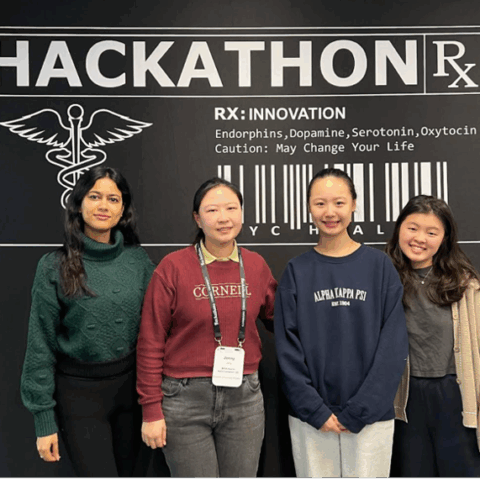Sloan MHA students support 10th annual Cornell Health Hackathon

In March, the 10th annual Cornell Health Hackathon brought 150 students from universities across the country to New York City for a weekend of rapid prototyping guided by industry experts. Hosted by Entrepreneurship at Cornell, this year’s hackathon focused on developing AI-driven healthcare solutions that protect patient privacy.
Participants were challenged to build prototypes or strong proof-of-concept solutions that enhance care delivery, improve access, and optimize workflows while maintaining data privacy and security. Teams explored technologies such as decentralized data collaboration, AI-based analytics, and digital health tools designed to operate within the constraints of healthcare privacy regulations.
The Sloan Program in Health Administration’s Healthcare Students Association (HSA) served as a planning partner. HSA members Sophia Lee MHA ’25, Alexa Okada MHA ’26, Justin Herzfeld MHA ’26, and Keshaav Krishnaa Pothapur MHA ’25 contributed by identifying relevant healthcare challenge areas, reviewing mentor applications, and supporting on-site operations throughout the three-day event.
“Volunteering at the Hackathon gave me a deeper appreciation for the hard work and planning that happens behind the scenes,” said Sophia Lee, HSA’s Director of Hackathons and Strategic Operations. “It was also incredibly inspiring as an aspiring healthcare professional to see students dedicate their weekend to collaborating and tackling real-world healthcare challenges.”
One of the standout Sloan MHA participants, Jenny Jiang MHA ’25, reflected on her experience, emphasizing the transformative nature of the hackathon. “The immersive experience challenged us to apply population health theories beyond the classroom, transforming them into a practical product that reduces administrative costs associated with screening for Social Determinants of Health (SDoH),” she shared.
Inspired by coursework with Brooks faculty member Julie H. Carmalt, Jiang’s team explored the importance of SDoH screening in marginalized communities, where chronic disease rates are higher and access to healthcare is limited. Their final product, a digital screening system integrated with EHR platforms, uses keyword captures to flag high-risk patients for early intervention by social workers.
